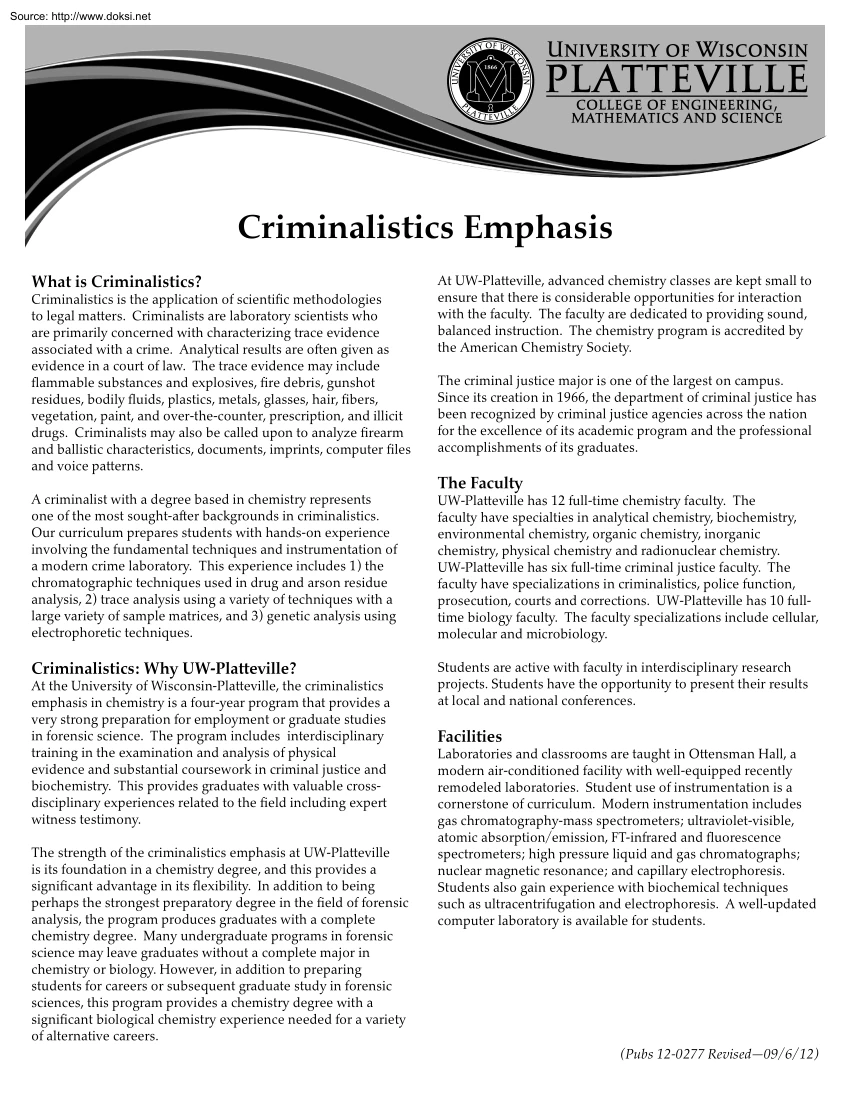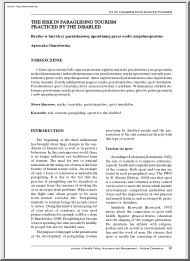A doksi online olvasásához kérlek jelentkezz be!

A doksi online olvasásához kérlek jelentkezz be!
Nincs még értékelés. Legyél Te az első!
Tartalmi kivonat
Source: http://www.doksinet Criminalistics Emphasis What is Criminalistics? Criminalistics is the application of scientific methodologies to legal matters. Criminalists are laboratory scientists who are primarily concerned with characterizing trace evidence associated with a crime. Analytical results are often given as evidence in a court of law. The trace evidence may include flammable substances and explosives, fire debris, gunshot residues, bodily fluids, plastics, metals, glasses, hair, fibers, vegetation, paint, and over-the-counter, prescription, and illicit drugs. Criminalists may also be called upon to analyze firearm and ballistic characteristics, documents, imprints, computer files and voice patterns. A criminalist with a degree based in chemistry represents one of the most sought-after backgrounds in criminalistics. Our curriculum prepares students with hands-on experience involving the fundamental techniques and instrumentation of a modern crime laboratory. This
experience includes 1) the chromatographic techniques used in drug and arson residue analysis, 2) trace analysis using a variety of techniques with a large variety of sample matrices, and 3) genetic analysis using electrophoretic techniques. Criminalistics: Why UW-Platteville? At the University of Wisconsin-Platteville, the criminalistics emphasis in chemistry is a four-year program that provides a very strong preparation for employment or graduate studies in forensic science. The program includes interdisciplinary training in the examination and analysis of physical evidence and substantial coursework in criminal justice and biochemistry. This provides graduates with valuable crossdisciplinary experiences related to the field including expert witness testimony. The strength of the criminalistics emphasis at UW-Platteville is its foundation in a chemistry degree, and this provides a significant advantage in its flexibility. In addition to being perhaps the strongest preparatory
degree in the field of forensic analysis, the program produces graduates with a complete chemistry degree. Many undergraduate programs in forensic science may leave graduates without a complete major in chemistry or biology. However, in addition to preparing students for careers or subsequent graduate study in forensic sciences, this program provides a chemistry degree with a significant biological chemistry experience needed for a variety of alternative careers. At UW-Platteville, advanced chemistry classes are kept small to ensure that there is considerable opportunities for interaction with the faculty. The faculty are dedicated to providing sound, balanced instruction. The chemistry program is accredited by the American Chemistry Society. The criminal justice major is one of the largest on campus. Since its creation in 1966, the department of criminal justice has been recognized by criminal justice agencies across the nation for the excellence of its academic program and the
professional accomplishments of its graduates. The Faculty UW-Platteville has 12 full-time chemistry faculty. The faculty have specialties in analytical chemistry, biochemistry, environmental chemistry, organic chemistry, inorganic chemistry, physical chemistry and radionuclear chemistry. UW-Platteville has six full-time criminal justice faculty. The faculty have specializations in criminalistics, police function, prosecution, courts and corrections. UW-Platteville has 10 fulltime biology faculty The faculty specializations include cellular, molecular and microbiology. Students are active with faculty in interdisciplinary research projects. Students have the opportunity to present their results at local and national conferences. Facilities Laboratories and classrooms are taught in Ottensman Hall, a modern air-conditioned facility with well-equipped recently remodeled laboratories. Student use of instrumentation is a cornerstone of curriculum. Modern instrumentation includes gas
chromatography-mass spectrometers; ultraviolet-visible, atomic absorption/emission, FT-infrared and fluorescence spectrometers; high pressure liquid and gas chromatographs; nuclear magnetic resonance; and capillary electrophoresis. Students also gain experience with biochemical techniques such as ultracentrifugation and electrophoresis. A well-updated computer laboratory is available for students. (Pubs 12-0277 Revised09/6/12) Source: http://www.doksinet Student Activities Criminalistics majors at UW-Platteville participate in the Alchemists, an active student affiliate of the American Chemical Society. Alchemists activities include field trips, chemical demonstrations at area elementary schools, and presentations by and informal discussions with visiting industrial and academic chemists. Criminalistics majors also participate in the Criminal Justice Association. Activities include speakers, field trips and social events. Field trips have included visits to crime labs, prisons and
drug rehabilitation centers. Demand for Criminalistics Graduates There are approximately 40,000 police agencies in the United States which gather physical evidence that must be analyzed. Their case load is increasing. Analysis of smaller size samples enabled by advances in chromatography and spectroscophy are also creating an increasing demand for highly skilled scientists. Scholarships A number of scholarships are available to majors including the Glen V. Gundy, Gerald F Richards, Glen Tilbury, Robert Hansen, and Chemistry Emeriti Faculty Scholarships. Majors may also be eligible for other college and university scholarships. Recommended High School Courses Student success is enhanced when students take the maximum number of courses in mathematics, biology, chemistry, physics and English. UW-Platteville offers test-out examinations for students with advanced preparation. For More Information For more information about the criminalistics program at UW-Platteville, write the
chair at the Department of Chemistry and Engineering Physics, UW-Platteville, 1 University Plaza, Platteville WI 53818-3099 or call 608.3421651 or e-mail chemep@uwplatt.edu or consult the Web at wwwuwplattedu/ chemep/chem/. For general information on the university and its programs, consult the website at www.uwplattedu or contact Prospective Student Services, 1 University Plaza, Platteville WI 53818-3099 or call toll-free 1.8778975288 or 6083421127 The University of Wisconsin-Platteville does not discriminate on the basis of age, race, creed, color, handicap, sex, sexual orientation, developmental disability, national origin, ancestry, marital status, arrest record or conviction record
experience includes 1) the chromatographic techniques used in drug and arson residue analysis, 2) trace analysis using a variety of techniques with a large variety of sample matrices, and 3) genetic analysis using electrophoretic techniques. Criminalistics: Why UW-Platteville? At the University of Wisconsin-Platteville, the criminalistics emphasis in chemistry is a four-year program that provides a very strong preparation for employment or graduate studies in forensic science. The program includes interdisciplinary training in the examination and analysis of physical evidence and substantial coursework in criminal justice and biochemistry. This provides graduates with valuable crossdisciplinary experiences related to the field including expert witness testimony. The strength of the criminalistics emphasis at UW-Platteville is its foundation in a chemistry degree, and this provides a significant advantage in its flexibility. In addition to being perhaps the strongest preparatory
degree in the field of forensic analysis, the program produces graduates with a complete chemistry degree. Many undergraduate programs in forensic science may leave graduates without a complete major in chemistry or biology. However, in addition to preparing students for careers or subsequent graduate study in forensic sciences, this program provides a chemistry degree with a significant biological chemistry experience needed for a variety of alternative careers. At UW-Platteville, advanced chemistry classes are kept small to ensure that there is considerable opportunities for interaction with the faculty. The faculty are dedicated to providing sound, balanced instruction. The chemistry program is accredited by the American Chemistry Society. The criminal justice major is one of the largest on campus. Since its creation in 1966, the department of criminal justice has been recognized by criminal justice agencies across the nation for the excellence of its academic program and the
professional accomplishments of its graduates. The Faculty UW-Platteville has 12 full-time chemistry faculty. The faculty have specialties in analytical chemistry, biochemistry, environmental chemistry, organic chemistry, inorganic chemistry, physical chemistry and radionuclear chemistry. UW-Platteville has six full-time criminal justice faculty. The faculty have specializations in criminalistics, police function, prosecution, courts and corrections. UW-Platteville has 10 fulltime biology faculty The faculty specializations include cellular, molecular and microbiology. Students are active with faculty in interdisciplinary research projects. Students have the opportunity to present their results at local and national conferences. Facilities Laboratories and classrooms are taught in Ottensman Hall, a modern air-conditioned facility with well-equipped recently remodeled laboratories. Student use of instrumentation is a cornerstone of curriculum. Modern instrumentation includes gas
chromatography-mass spectrometers; ultraviolet-visible, atomic absorption/emission, FT-infrared and fluorescence spectrometers; high pressure liquid and gas chromatographs; nuclear magnetic resonance; and capillary electrophoresis. Students also gain experience with biochemical techniques such as ultracentrifugation and electrophoresis. A well-updated computer laboratory is available for students. (Pubs 12-0277 Revised09/6/12) Source: http://www.doksinet Student Activities Criminalistics majors at UW-Platteville participate in the Alchemists, an active student affiliate of the American Chemical Society. Alchemists activities include field trips, chemical demonstrations at area elementary schools, and presentations by and informal discussions with visiting industrial and academic chemists. Criminalistics majors also participate in the Criminal Justice Association. Activities include speakers, field trips and social events. Field trips have included visits to crime labs, prisons and
drug rehabilitation centers. Demand for Criminalistics Graduates There are approximately 40,000 police agencies in the United States which gather physical evidence that must be analyzed. Their case load is increasing. Analysis of smaller size samples enabled by advances in chromatography and spectroscophy are also creating an increasing demand for highly skilled scientists. Scholarships A number of scholarships are available to majors including the Glen V. Gundy, Gerald F Richards, Glen Tilbury, Robert Hansen, and Chemistry Emeriti Faculty Scholarships. Majors may also be eligible for other college and university scholarships. Recommended High School Courses Student success is enhanced when students take the maximum number of courses in mathematics, biology, chemistry, physics and English. UW-Platteville offers test-out examinations for students with advanced preparation. For More Information For more information about the criminalistics program at UW-Platteville, write the
chair at the Department of Chemistry and Engineering Physics, UW-Platteville, 1 University Plaza, Platteville WI 53818-3099 or call 608.3421651 or e-mail chemep@uwplatt.edu or consult the Web at wwwuwplattedu/ chemep/chem/. For general information on the university and its programs, consult the website at www.uwplattedu or contact Prospective Student Services, 1 University Plaza, Platteville WI 53818-3099 or call toll-free 1.8778975288 or 6083421127 The University of Wisconsin-Platteville does not discriminate on the basis of age, race, creed, color, handicap, sex, sexual orientation, developmental disability, national origin, ancestry, marital status, arrest record or conviction record




